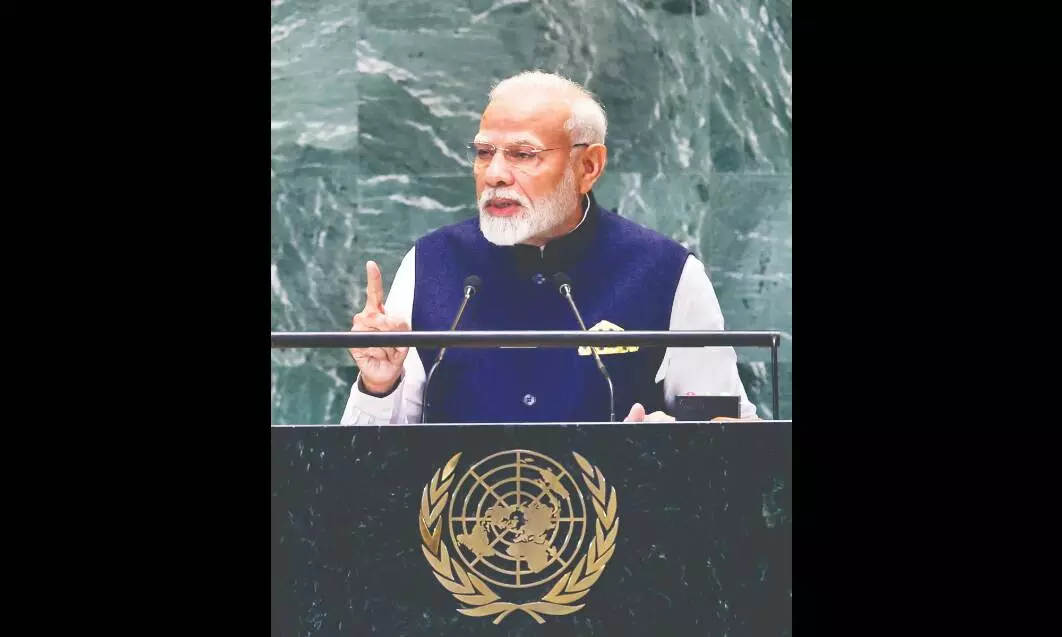Humanity’s success lies in collective strength, not on battlefield: PM Modi

United Nations/New Delhi: Prime Minister Narendra Modi highlighted the power of collective global action, stating, “Humanity’s success lies in our collective strength, not on the battlefield,” as he addressed world leaders at the United Nations’ Summit of the Future on Monday. His remarks came amidst ongoing global conflicts, most notably the Israel-Hamas confrontation and the war in Ukraine, as well as challenges like climate change and geopolitical tensions.
Speaking from the podium in the UN General Assembly Hall, Modi began with a “Namaskar,” representing the voice of 1.4 billion Indians. He highlighted the need for a human-centric approach in tackling the world’s most pressing challenges, particularly when shaping the global future.
“When we are discussing the Global Future, we must accord the highest priority to a human-centric approach,” Modi said. His speech followed the adoption of the Pact for the Future, a document that lays the foundation for sustainable development, international peace, technological governance, youth engagement, and global governance reforms.
The summit coincided with the UN’s drive to tackle a wide range of global issues. As the UN approaches its 80th anniversary, calls for institutional reform have intensified, and Modi reiterated that meaningful reform is essential for global institutions to stay relevant. “For global peace and development, reforms in global institutions are essential,” he stated.
Modi spotlighted the inclusion of the African Union as a permanent member of the G20, a move championed by India during the G20 Summit in New Delhi. He emphasised that this step was a significant part of broader efforts to make global governance more representative of today’s geopolitical landscape.
“For years, India has advocated for reform in the United Nations Security Council (UNSC),” Modi added. “The UNSC must reflect today’s geopolitical realities, and India, representing one-sixth of humanity, rightly deserves a permanent seat at the table,” he said. India’s push for reform in international institutions, particularly the UNSC, has gained traction in recent years. As a non-permanent member from 2021 to 2022, India has been vocal about making these institutions more inclusive and effective.
Modi also stressed the need for global collaboration to meet today’s challenges, including the rise of terrorism and emerging conflicts in cyber, maritime, and space domains. “While terrorism continues to be a serious threat to global peace and security, areas such as cyber, maritime, and space are emerging as new theatres of conflict,” he warned.
In addressing these new challenges, Modi emphasised the need for coordinated international responses: “On all these issues, I will stress that global action must match global ambition!”
Highlighting India’s achievements in lifting 250 million people out of poverty, Modi underscored the country’s commitment to sharing its development successes with the Global South. “India is ready to share its digital public infrastructure with the world for the global good,” he remarked, pointing to India’s pioneering role in using digital technologies to drive economic inclusion.
Modi’s government has been widely praised for its efforts to digitise India’s economy, leveraging technology to bring millions of people into the formal financial system. He called for balanced regulations to ensure that digital public infrastructure promotes cooperation, not division. “We need global digital governance that ensures national sovereignty and integrity are upheld. Digital Public Infrastructure should be a bridge, not a barrier!” he said.
Opening the summit, UN Secretary-General António Guterres warned of the risks posed by escalating conflicts and outdated institutions. “Our world is heading off the rails, and we need tough decisions to get back on track,” Guterres said, referring to the wars in Ukraine, the Middle East, and Sudan.
The Pact for the Future, adopted on the first day of the summit, sets the stage for international cooperation on peace, security, sustainable development, and technological governance. It aims to address the underrepresentation of Africa, Asia-Pacific, and Latin America in global institutions and lay the groundwork for a more inclusive and sustainable world.
Modi’s remarks, echoed by Guterres and other world leaders, underline the urgent need for a collective approach to solving global problems. “India will continue to work in thought, words, and deeds to protect the rights of all humanity and ensure global prosperity,” Modi affirmed, closing his speech.
of India (ASI). The locals were digging a pond when they discovered the idol, Dr Shivakant Bajpai, Superintending Archaeologist of Bengaluru circle, told the news agency. The idol, according to him, belongs to the Hoysala era -- the dynasty that had ruled the region from 10th century to 14th century and had built monuments such as the Chennakesava temple in Belur and Hoysaleshwarm, belongs to the Hoysala era -- the dynasty that had ruled the region from 10th century to 14th century and had built monuments such as the Chennakesava temple in Belur and Hoysaleshwarm, belongs to the Hoysala era -- the dynasty that had ruled the region from 10th century to 14th century and had built monuments such as the Chennakesava temple in Belur and Hoysaleshwara Shiva Temple in Halebeedu in Hassan district. An ASI officer has been dispatched to look into the discovery and he may submit his report by Monday, Bajpai said. with agency inputs



